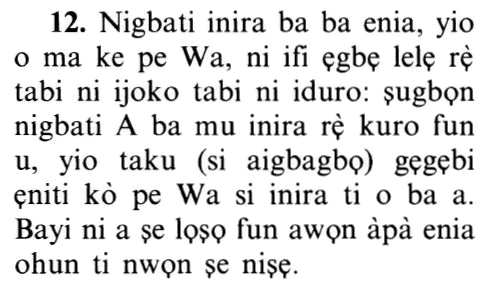10vs12
Select any filter and click on Go! to see results
وَإِذَا مَسَّ الإِنسَانَ الضُّرُّ دَعَانَا لِجَنبِهِ أَوْ قَاعِداً أَوْ قَآئِماً فَلَمَّا كَشَفْنَا عَنْهُ ضُرَّهُ مَرَّ كَأَن لَّمْ يَدْعُنَا إِلَى ضُرٍّ مَّسَّهُ كَذَلِكَ زُيِّنَ لِلْمُسْرِفِينَ مَا كَانُواْ يَعْمَلُونَ
Waitha massa alinsana alddurru daAAana lijanbihi aw qaAAidan aw qaiman falamma kashafna AAanhu durrahu marra kaan lam yadAAuna ila durrin massahu kathalika zuyyina lilmusrifeena ma kanoo yaAAmaloona
Index Terms
Click to play
Yoruba Translation

Hausa Translation
Kuma idan cũta ta shãfi mutum, sai ya kirãye Mu, yanã (kwance) ga sãshensa kõ kuwa zaune, kõ kuwa a tsaye. To, a lõkacin, da Muka kuranye cũtar daga gare shi, sai ya shũɗe kamar ɗai bai kirãye Mu ba zuwa ga wata cũta wadda ta shãfe shi. Kamar wannan ne aka ƙawãta ga maɓannata, abin da suka kasance sunã aikatãwa.
Asbabu n-Nuzuul (Occasions of Revelation)
Man remembers Allah at Times of Adversity and forgets Him at Times of Prosperity
Allah says;
وَإِذَا مَسَّ الإِنسَانَ الضُّرُّ دَعَانَا لِجَنبِهِ أَوْ قَاعِدًا أَوْ قَآئِمًا فَلَمَّا كَشَفْنَا عَنْهُ ضُرَّهُ ...
And when harm touches man, he invokes Us, lying on his side, or sitting or standing. But when We have removed his harm from him,
Allah tells us about man and how he becomes annoyed and worried when he is touched with distress.
وَإِذَا مَسَّهُ الشَّرُّ فَذُو دُعَآءٍ عَرِيضٍ
but when evil touches him, then he has recourse to long supplications. (41:51)
`Long supplications' also means many supplications.
When man suffers adversity he becomes worried and anxious. So he supplicates more. He prays to Allah to lift and remove the adversity. He prays while standing, sitting or laying down. When Allah removes his adversity and lifts his distress, he turns away and becomes arrogant. He goes on as if nothing were wrong with him before.
... مَرَّ كَأَن لَّمْ يَدْعُنَا إِلَى ضُرٍّ مَّسَّهُ ...
He passes on as if he had never invoked Us for a harm that touched him!
Allah then criticized and condemned those who have these qualities or act this way, so He said:
... كَذَلِكَ زُيِّنَ لِلْمُسْرِفِينَ مَا كَانُواْ يَعْمَلُونَ ﴿١٢﴾
Thus it is made fair seeming to the wasteful that which they used to do.
But those on whom Allah has bestowed good guidance and support are an exception.
إِلاَّ الَّذِينَ صَبَرُواْ وَعَمِلُواْ الصَّـلِحَاتِ
Except those who have patience believe and do righteous good deeds. (11:11)
The Prophet said:
عَجَبًا (لِأَمْرِ) الْمُؤْمِنِ لَا يَقْضِي اللهُ لَهُ قَضَاءً إِلَّا كَانَ خَيْرًا لَهُ، وَلَيْسَ ذَلِكَ لِأَحَدٍ إِلَّا لِلْمُؤْمِن
إِنْ أَصَابَتْهُ ضَرَّاءُ فَصَبَرَ كَانَ خَيْرًا لَهُ،
وَإِنْ أَصَابَتْهُ سَرَّاءُ فَشَكَرَ كَانَ خَيْرًا لَهُ،
How wonderful is the case of a believer; there is good for him in everything and this is not the case with anyone except a believer.
If prosperity attends him, he expresses gratitude to Allah, and that is good for him.
And if adversity befalls him, he endures it patiently and that is also good for him.
يخبر تعالى عن الإنسان وضجره وقلقه إذا مسه الشر " وإذا مسه الشر فذو دعاء عريض " أي كثير وهما في معنى واحد وذلك لأنه إذا أصابته شدة قلق لها وجزع منها وأكثر الدعاء عند ذلك فدعا الله في كشفها ورفعها عنه في حال اضطجاعه وقعوده وقيامه وفي جميع أحواله فإذا فرج الله شدته وكشف كربته أعرض ونأى بجانبه وذهب كأنه ما كان به من ذلك شيء " مر كأن لم يدعنا إلى ضر مسه " ثم ذم تعالى من هذه صفته وطريقته فقال " كذلك زين للمسرفين ما كانوا يعملون " فأما من رزقه الله الهداية والسداد والتوفيق والرشاد فإنه مستثنى من ذلك كقوله تعالى " إلا الذين صبروا وعملوا الصالحات " وكقول رسول الله صلى الله عليه وسلم " عجبا لأمر المؤمن لا يقضي الله له قضاء إلا كان خيرا له : إن أصابته ضراء فصبر كان خيرا له وإن أصابته سراء فشكر كان خيرا له وليس ذلك لأحد إلا للمؤمن " .
"وإذا مس الإنسان" الكافر "الضر" المرض والفقر "دعانا لجنبه" أي مضطجعا "أو قاعدا أو قائما" أي في كل حال "فلما كشفنا عنه ضره مر" على كفره "كأن" مخففة واسمها محذوف أي كأنه "لم يدعنا إلى ضر مسه كذلك" كما زين له الدعاء عند الضرر والإعراض عند الرخاء "زين للمسرفين" المشركين
قيل : المراد بالإنسان هنا الكافر , قيل : هو أبو حذيفة بن المغيرة المشرك , تصيبه البأساء والشدة والجهد . " دعانا لجنبه " أي على جنبه مضطجعا .
I'raab - grammatical analysis of the Qur'an
«وَإِذا» الواو استئنافية وإذا ظرف زمان يتضمن معنى الشرط.
«مَسَّ الْإِنْسانَ الضُّرُّ» ماض ومفعوله المقدم وفاعله المؤخر والجملة مضاف إليه.
«دَعانا» ماض مبني على الفتح المقدر على الألف للتعذر ونا مفعول به وفاعله مستتر والجملة لا محل لها من الإعراب لأنها جواب شرط غير جازم.
«لِجَنْبِهِ» متعلقان بمحذوف حال.
«أَوْ قاعِداً أَوْ قائِماً» معطوف على الحال المحذوفة.
«فَلَمَّا» الفاء عاطفة ولما الحينية ظرف زمان.
«كَشَفْنا» ماض وفاعله والجملة مضاف إليه.
«عَنْهُ» متعلقان بكشفنا.
«ضُرَّهُ» مفعول به والهاء مضاف إليه.
«مَرَّ» ماض فاعله مستتر والجملة لا محل لها من الإعراب لأنها جواب شرط غير جازم.
«كَأَنْ» مخففة من كأنّ واسمها ضمير الشأن والجملة حالية.
«لَمْ» جازمة.
«يَدْعُنا» مضارع مجزوم بحذف حرف العلة ونا فاعل والجملة خبر كأن.
«إِلى ضُرٍّ» متعلقان بيدعنا.
«مَسَّهُ» ماض ومفعوله وفاعله مستتر والجملة صفة لضر.
«كَذلِكَ» الكاف حرف جر وذا اسم إشارة في محل جر متعلقان بمحذوف صفة لمفعول مطلق محذوف واللام للبعد والكاف للخطاب.
«زُيِّنَ» ماض مبني للمجهول.
«لِلْمُسْرِفِينَ» متعلقان بزين.
«ما» اسم موصول نائب فاعل.
«كانُوا» كان واسمها والجملة صلة.
«يَعْمَلُونَ» مضارع مرفوع بثبوت النون والواو فاعل والجملة خبر كان.
